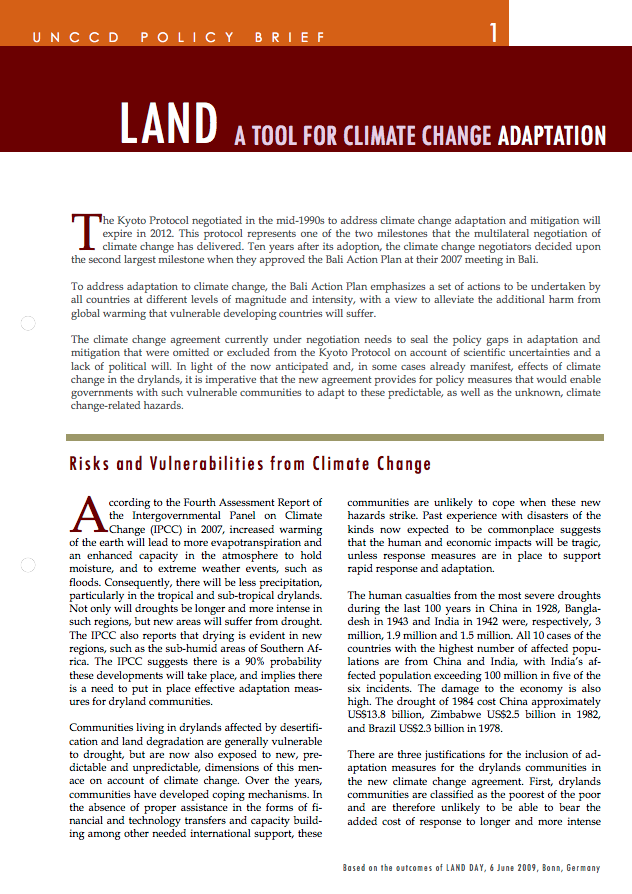Land: a tool for climate change adaptation
The Kyoto Protocol negotiated in the mid-1990s to address climate change adaptation and mitigation will expire in 2012. This protocol represents one of the two milestones that the multilateral negotiation of climate change has delivered. Ten years after its adoption, the climate change negotiators decided upon the second largest milestone when they approved the Bali Action Plan at their 2007 meeting in Bali.
Compulsory land acquisition and voluntary land conversion in Vietnam
The report provides recommendations on improving land policies to ensure the efficiency of their practical implementation and to target them at both economic development and social sustainability.
Land situation in Cambodia 2013
This report provides background on Cambodia's legal framework, as well as data on the granting of social land concessions, reclassification of land, the land titling program, and land disputes. Dispute resolution mechanisms are also discussed.
A new urban landscape in East-Southeast Asia, 2000-2010
East–Southeast Asia is currently one of the fastest urbanizing regions in the world, with countries such as China climbing from 20 to 50% urbanized in just a few decades. By 2050, these countries are projected to add 1 billion people, with 90% of that growth occurring in cities.
Bankrolling India’s dirty dozen
An analysis paper by Dustin Hoasa on the World Bank Group's lending practices, part 2 in Inclusive Development International (IDI)'s 'Outsourcing Development' series. Published by IDI in collaboration with the Bank Information Center, 11.11.11, Urgewald and Accountability Counsel in the United States, December 2016.
The political ecology of cross-sectoral cumulative impacts: modern landscapes, large hydropower dams and industrial tree plantations in Laos and Cambodia
This paper examines such interactions between industrial plantations and hydropower projects, demonstrating that it is the diverse livelihoods of local people – based on everyday use of multiple resources – that crucially connects aquatic and terrestrial environments. The paper presents case studies of social and environmental impacts occurring in the Mekong Region: in the Hinboun River Basin in Central Laos; the Xe Bang Fai River Basin, also in Central Laos; and the Sesan River Basin in northeastern Cambodia.
Losing ground: Forced evictions and intimidation in Cambodia
A book documenting stories of people affected by forced evictions in Cambodia. The personal stories show what is lost when a home is destroyed or livelihood disrupted; and how people living in poverty are routinely excluded from decisions affecting them. Case studies include evictions from Boeung Kak Lake, Battambang, Koh Kong, Preah Sihanouk, Pursat and Kampong Chhnang, Phnom Penh, Kratie and Siem Reap.
Agrarian land-use transformation in northern Laos
Farmers in northern Laos have been experiencing a rapid transformation from subsistence agricultural production to intensive cash crop cultivation over the last decade. The current research examines land-use change patterns and the driving forces behind farmer’s decisions regarding changing land use and selecting crops, particularly in areas along the new North-South Economic Corridor that passes through Luang Namtha and Bokeo provinces in northwestern Laos.
Trying to follow the Money: Possibilities and limits of investor transparency in Southeast Asia’s rush for “available” land
This study uses publicly available financial and spatial data to examine the geography of land-intensive investment in Southeast Asia, and to identify the
limits imposed by problems with data availability. It focuses on three regions where land has been widely seen to be available for new investment: Indonesia’s outer islands; the “development triangle” where Cambodia, Laos and Vietnam meet; and the Golden Quadrangle region which comprises the borderlands of northeastern Myanmar, northwestern Laos, southern and western Yunnan, and northern Thailand.
From land grab to agrarian transition? Hybrid trajectories of accumulation and environmental change on the Cambodia–Vietnam border
This paper explores the divergent processes of agrarian transition in Cambodia and Vietnam and the ways in which they intersect through flows across the border, arguing that it is not possible to understand current processes of agrarian change in Cambodia without being attentive to agrarian histories in Vietnam.
Agricultural change in Lao PDR: Pragmatism in the face of adversity January, 2007
Rural development in the uplands of Lao Peoples’ Democratic Republic (Lao PDR) has presented many challenges for farmers and their communities. Lao government policy is directed at reducing the production of upland rice and providing sustainable alternative livelihoods for upland farmers.



